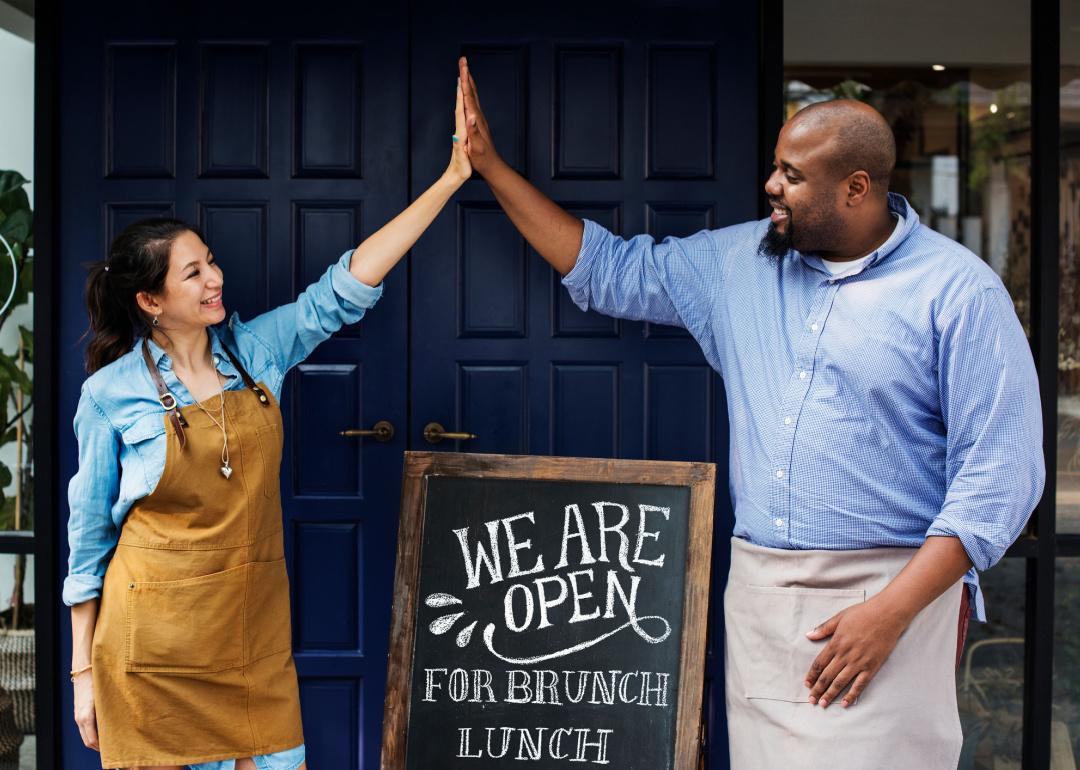Founding, franchising, or buying: What’s the right option for your new business?

Rawpixel.com // Shutterstock
Founding, franchising, or buying: What’s the right option for your new business?
Cheerful business owners standing with ‘Open’ blackboard.
One silver lining from the COVID-19 pandemic was that it reignited America’s entrepreneurial spirit. In 2019, the Census Bureau tracked about 3.5 million new business applications. In 2022, that number jumped 44%, to over 5 million.
People start new businesses for various reasons, including sudden unemployment, which spiked at the beginning of the pandemic. People also discovered a need for flexible work, and many wanted to create a more fulfilling job and control their destinies.
While tech startups get a lot of attention, there are many types of new businesses that open each year, from a sole proprietorship with no employees to a partnership with multiple owners that employs a dozen staffers.
There are also business owners who might opt to buy a franchise, a company that licenses the use of its business model, materials, and goods or services to investors. These investors, known as franchisees, must pay a one-time franchise fee to the larger company along with royalties. Entrepreneurs can also get into business ownership by acquiring an existing business from another owner.
Thinking of becoming your own boss but don’t know where to begin?
Next Insurance analyzed resources from the Small Business Administration, the Census Bureau, and news reports to outline the pros and cons of entering business ownership through acquisition, startup, and franchising.
![]()

Monkey Business Images // Shutterstock
Bootstrapping your own business for ultimate control
Business owner with digital tablet standing behind sales desk.
Starting your own business from scratch gives you control over your work—from the product or service you sell to the deadlines you set to the people you hire. Startups also give you a lot of creativity to try new ways to bring your ideas to fruition and see how they improve other people’s lives.
When you start with a blank slate, you’re responsible for all of the decisions, from the type of business you want to create to how you will make, sell, and market your products. It’s important to write a thorough business plan to help you think through all of these details so you can set and achieve business goals.
Startups also incur costs before you get your first customer—things like legal fees, licenses, inventory, and various marketing costs you may have to pay out of pocket for years before making a profit. The Small Business Administration recommends listing what they are before you get started so you can get startup loans, investors, and determine when you’ll be able to break even.

Dragana Gordic // Shutterstock
Hit the ground running as a franchisee
Male shop owner looking at laptop.
When you buy a franchise, you run a business with name recognition with customers, avoiding the expensive and time-consuming costs of bringing a brand-new business to life. While you may think of fast-food restaurants as a franchise, the Census Bureau notes franchise opportunities exist in almost 300 industries, including hotels, beauty salons, gas stations, fitness centers, and day care centers.
In this business model, you pay a franchise fee for the right to open an outlet, royalties based on your sales, and often advertising fees. This may require a significant investment of tens or even hundreds of thousands of dollars—not just in fees but also in the costs of outfitting and opening your business location.
While you do buy into a proven business model, owning a franchise takes away some of the creativity of being a business owner. Franchisors have uniform ways of how their businesses run and look—and you must adhere to their procedures.
You also have no control over how an incident at the parent company can affect your business, such as Papa Johns’ public-relations debacle that caused the NFL to end its partnership with the pizza company.

JLco Julia Amaral // Shutterstock
Buying an existing business and charting a new chapter
Two women business owners shaking hands.
If financial freedom is your goal, buying an existing business may be a low-risk way to reach that goal more quickly. Plus, someone else has done the hard work of bootstrapping the business, so you get the creativity of running your own business without the headaches of starting from nothing.
When you buy another business, you’ll know its operating costs, systems, and procedures, and you’ll also have skilled employees and an existing customer base.
On the flip side, you typically need to have a good deal of money already to buy an existing business. You also must do your due diligence to ensure the business has good financials and know if you’ll be on the hook for any missed tax payments or other debts.
If equipment is outdated, you may have to invest more money to make the necessary upgrades to stay competitive. You should also get to know the company culture to know whether it’s a well-oiled machine or if you’ll have to put in extra work to make improvements.
This story originally appeared on Next Insurance and was produced and
distributed in partnership with Stacker Studio.






